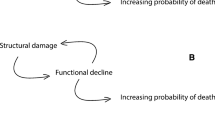Abstract
Man’s self-awareness has proven to be uncomfortable to him; he realizes that his life-span is finite, and knows of nothing that will prevent his physical and mental health from slowly declining to the point where death will be unavoidable. Naturally man, with his characteristic curiosity and love of life, wonders why this is so, how it happens, and what can be done, or should be done, about it. Is our life-span sufficient? If we should live any longer, would it be unbearable? An important difference exists between simply living out one’s natural life-span and living the same number of years in an optimum state of vigor and health. Man’s optimum period is from about 14 to 30 years of age, or only about one-fifth of his life-span.
The ancient covenant is in pieces; man knows at last he is alone in the universe’s unfeeling immensity, out of which he emerged only by chance. His destiny is nowhere spelled out, nor is his duty. The kingdom above or the darkness below: it is for him to choose.
Chance and Necessity — Jacques Monod, 1971
Access this chapter
Tax calculation will be finalised at checkout
Purchases are for personal use only
Preview
Unable to display preview. Download preview PDF.
Similar content being viewed by others
Bibliography
Cutler, R. G. 1975. Evolution of human longevity and the genetic complexity governing aging rate. Proceedings of the National Academy of Sciences of the USA 72: 4664.
Cutler, R. G. 1976. Evolution of longevity in primates. Journal of Human Evolution 5: 169.
Cutler, R. G. 1976. On the nature of aging and life maintenance processes. In R. G. Cutler, ed. Interdisciplinary topics in gerontology, Vol. 9, p. 83. S. Karger AG, Basel.
Dawkins, R. 1976. The selfish gene. Oxford University Press, New York.
Everitt, A. V., and J. A. Burgess, eds. 1976. Hypothalamus, pituitary and aging. Charles C Thomas, Publisher, Springfield, Ill.
Margulis, L. 1970. Origin of eukaryotic cells. Yale University Press, New Haven, Conn.
Medawar, P. B. 1952. An unsolved problem of biology. H. K. Lewis, London.
Monod, J. 1971. Chance and necessity. Alfred A. Knopf, Inc., New York.
Williams, G. C. 1957. Pleiotropy, natural selection, and the evolution of senescence. Evolution 11: 398.
Author information
Authors and Affiliations
Editor information
Editors and Affiliations
Rights and permissions
Copyright information
© 1978 Plenum Press, New York
About this chapter
Cite this chapter
Cutler, R.G. (1978). Evolutionary Biology of Senescence. In: Behnke, J.A., Finch, C.E., Moment, G.B. (eds) The Biology of Aging. Springer, Boston, MA. https://doi.org/10.1007/978-1-4613-3994-6_20
Download citation
DOI: https://doi.org/10.1007/978-1-4613-3994-6_20
Publisher Name: Springer, Boston, MA
Print ISBN: 978-1-4613-3996-0
Online ISBN: 978-1-4613-3994-6
eBook Packages: Springer Book Archive




